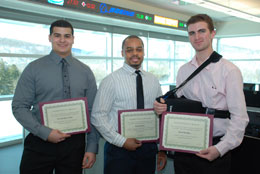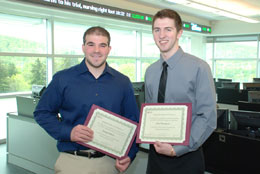- About Ramapo
- Academics
- Admissions & Aid
- Student Life
- Athletics
- Alumni
- Arts & Community
- Quick Links
- Apply
- Visit
- Give
Trading Competitions
 Each semester, students have the opportunity to test their investment acumen in the “ASB Wizard of Wall St.” Trading Competition. ASB students start with a mock portfolio of $1 million, and can trade stocks on a cash basis, execute margin trades, and short stocks. At the end of each Competition, the top 3 finishers are awarded cash prizes.
Each semester, students have the opportunity to test their investment acumen in the “ASB Wizard of Wall St.” Trading Competition. ASB students start with a mock portfolio of $1 million, and can trade stocks on a cash basis, execute margin trades, and short stocks. At the end of each Competition, the top 3 finishers are awarded cash prizes.
The first Trading Competition was conducted during the Fall 2009 semester. In the first iteration, students were able to trade stocks included in the Standard & Poors 500 Index. Students participated either as individuals or in teams, and a total of 63 competitors and 83 students participated in the first contest.
The first “ASB Wizard of Wall St.” was Kevin Leard with a total return of +9.3%. The second place finisher was Lazaro Hernandez with a return of +8.9%, and the third place finisher was Geoff Kiddoo with a return of +8.7%. All top 3 finishers outperformed the S&P 500 Index, which was up 5.1% over the investment period. The top 3 finishers attributed their success to a long-term investment horizon, performing fundamental analysis to determine whether a stock was undervalued, and evaluating industries to flush out secular growth opportunities.
Spring 2011 “Wizard of Wall St.” Trading Competition
 The second Trading Competition held during the Spring 2011 semester expanded the investment pool by going Global, and including other asset classes. Students were able to trade stocks outside of the U.S: Europe, Japan, Australia, Hong Kong, India, Singapore, Malaysia, and Indonesia. In addition, students were able to trade foreign currencies, gold futures, oil futures, and S&P futures.
The second Trading Competition held during the Spring 2011 semester expanded the investment pool by going Global, and including other asset classes. Students were able to trade stocks outside of the U.S: Europe, Japan, Australia, Hong Kong, India, Singapore, Malaysia, and Indonesia. In addition, students were able to trade foreign currencies, gold futures, oil futures, and S&P futures.
The top 3 finishers in the Spring 2011 posted excellent performance. The “ASB Wizard of Wall St.” was Eric Thompson, with a return of 64.7%. The second place finisher was Joseph Peluso, with a return of 36.5%, and the third place finisher was Robert Bolejszo with a return of 18.5%. All 3 significantly outperformed the S&P 500 Index, which had a meager return of 3.9%. The success of these students was predicated on trading in commodities. Commodities surged on unrest in the Middle East, and the uncertainty and potential disruption led to spikes in oil and gold.
Copyright ©2025 Ramapo College Of New Jersey. Statements And Policies. Contact Webmaster.

Follow Ramapo